高二英语必修五Unit 4 Making the news Reading 2课件 (共22张PPT)
文档属性
| 名称 | 高二英语必修五Unit 4 Making the news Reading 2课件 (共22张PPT) | 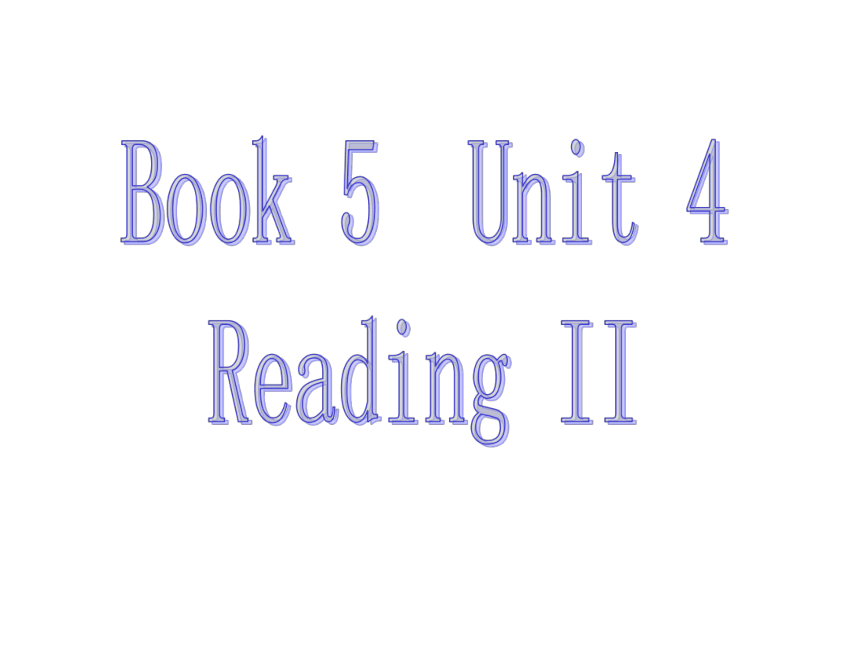 | |
| 格式 | zip | ||
| 文件大小 | 31.0KB | ||
| 资源类型 | 教案 | ||
| 版本资源 | 人教版(新课程标准) | ||
| 科目 | 英语 | ||
| 更新时间 | 2016-09-18 20:34:26 | ||
图片预览

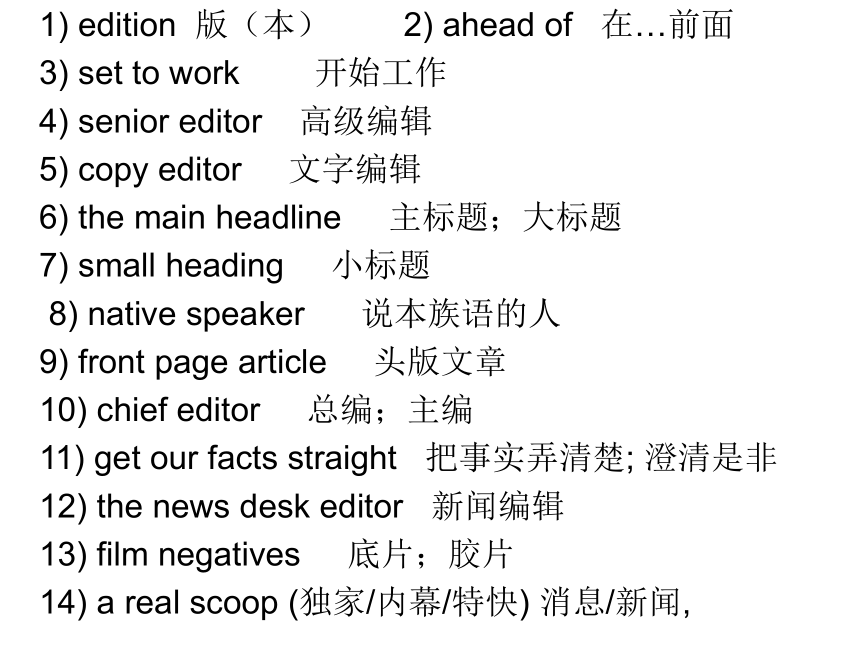
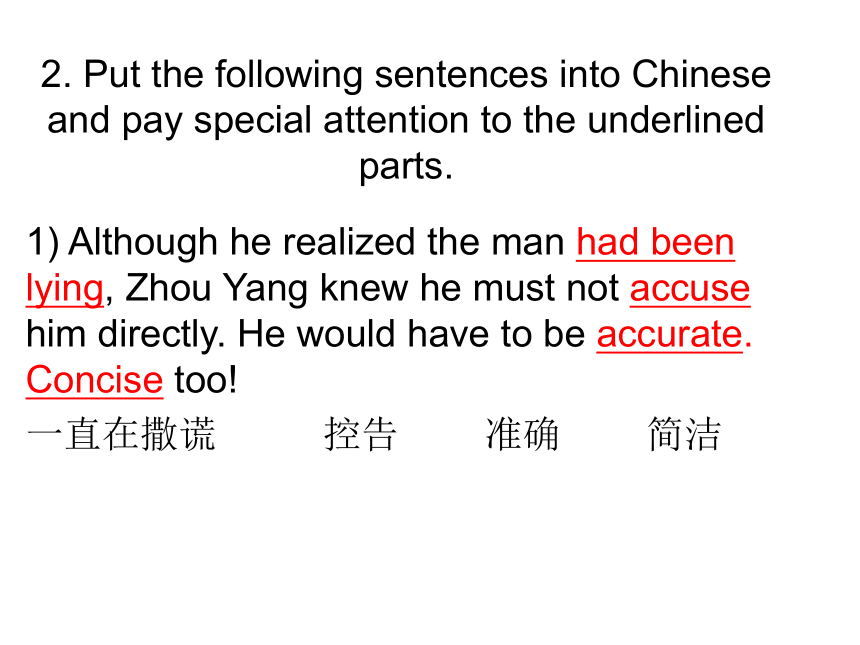
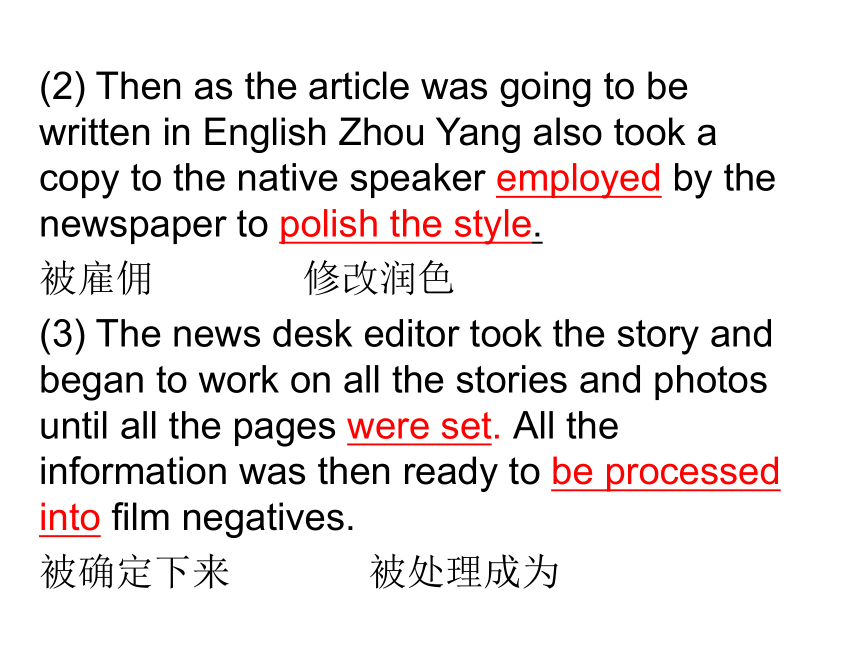
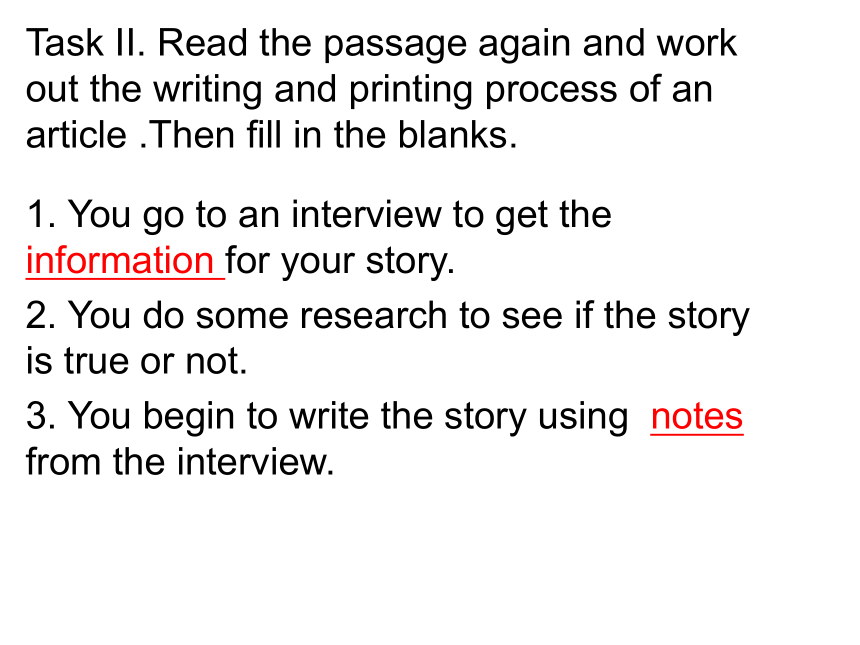
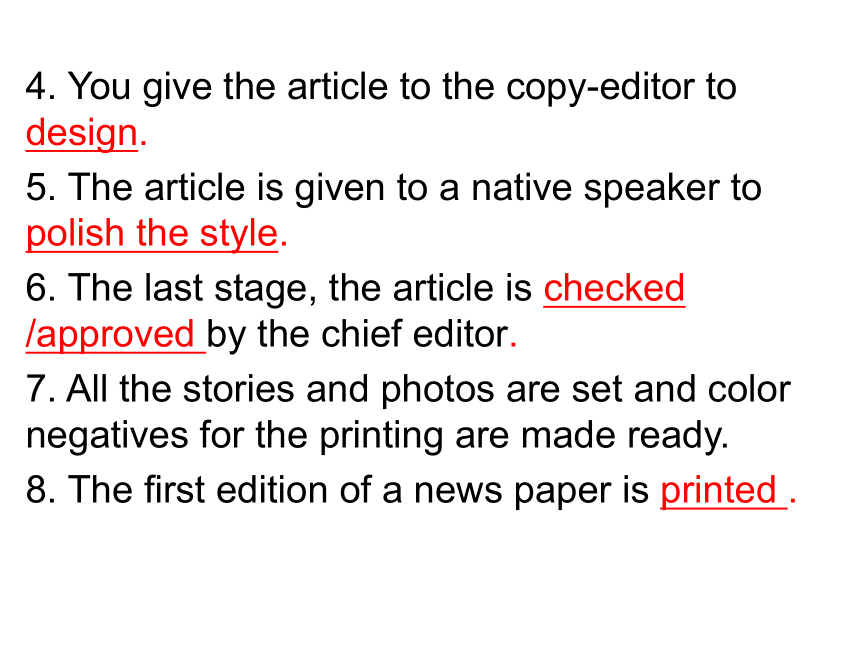
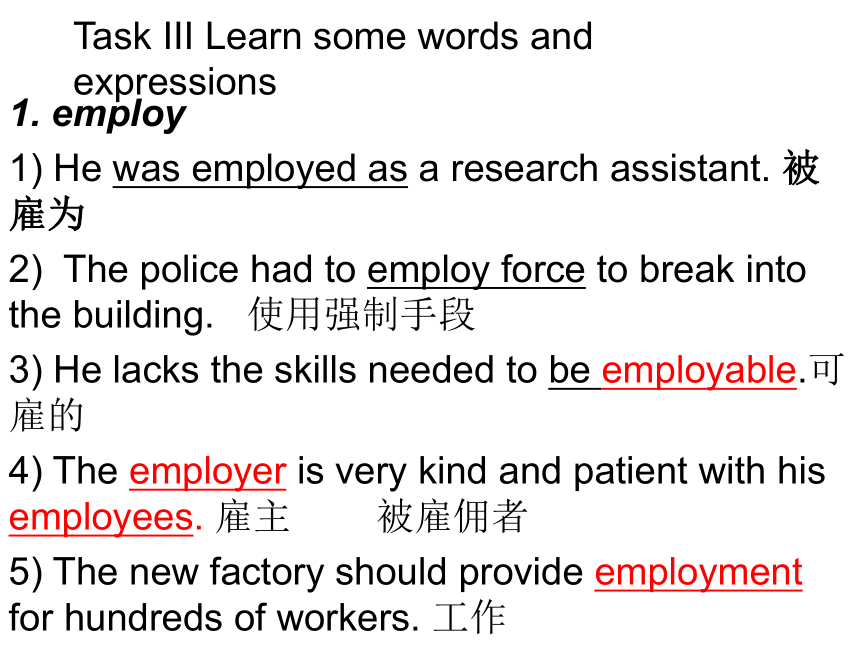
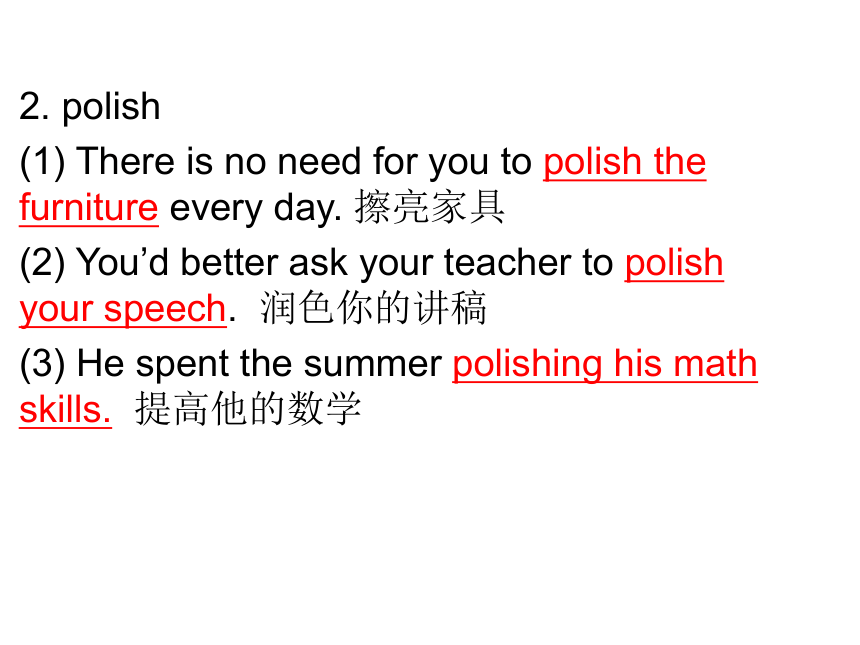
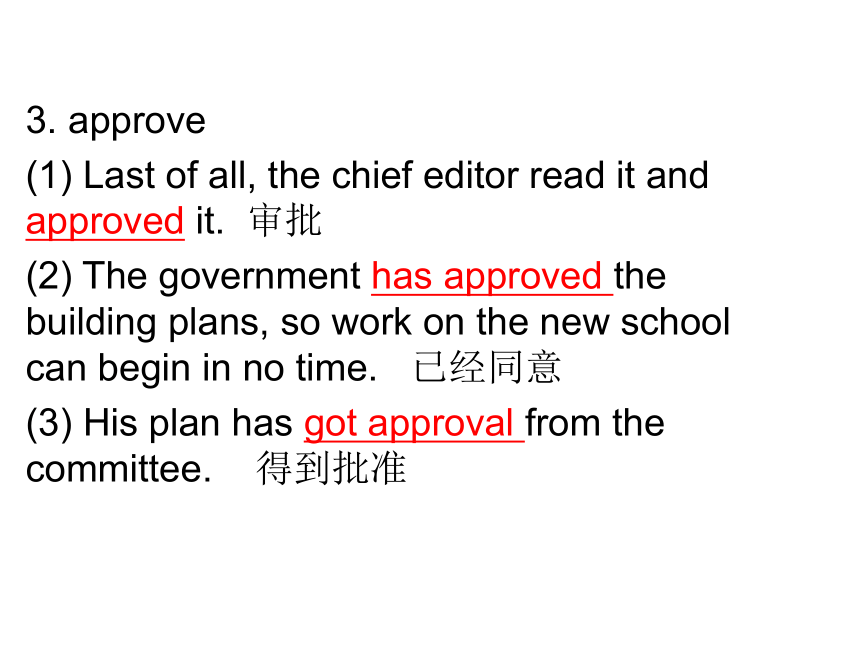
文档简介
课件22张PPT。Book 5 Unit 4
Reading II1) edition 版(本) 2) ahead of 在…前面
3) set to work 开始工作
4) senior editor 高级编辑
5) copy editor 文字编辑
6) the main headline 主标题;大标题
7) small heading 小标题
8) native speaker 说本族语的人
9) front page article 头版文章
10) chief editor 总编;主编
11) get our facts straight 把事实弄清楚; 澄清是非
12) the news desk editor 新闻编辑
13) film negatives 底片;胶片
14) a real scoop (独家/内幕/特快) 消息/新闻,
2. Put the following sentences into Chinese and pay special attention to the underlined parts. 1) Although he realized the man had been lying, Zhou Yang knew he must not accuse him directly. He would have to be accurate. Concise too!
一直在撒谎 控告 准确 简洁
(2) Then as the article was going to be written in English Zhou Yang also took a copy to the native speaker employed by the newspaper to polish the style.
被雇佣 修改润色
(3) The news desk editor took the story and began to work on all the stories and photos until all the pages were set. All the information was then ready to be processed into film negatives.
被确定下来 被处理成为 Task II. Read the passage again and work out the writing and printing process of an article .Then fill in the blanks. 1. You go to an interview to get the information for your story.
2. You do some research to see if the story is true or not.
3. You begin to write the story using notes from the interview.
4. You give the article to the copy-editor to design.
5. The article is given to a native speaker to polish the style.
6. The last stage, the article is checked /approved by the chief editor.
7. All the stories and photos are set and color negatives for the printing are made ready.
8. The first edition of a news paper is printed .
Task III Learn some words and expressions1. employ
1) He was employed as a research assistant. 被雇为
2) The police had to employ force to break into the building. 使用强制手段
3) He lacks the skills needed to be employable.可雇的
4) The employer is very kind and patient with his employees. 雇主 被雇佣者
5) The new factory should provide employment for hundreds of workers. 工作
6) He is a self-employed businessman. 自雇的
2. polish
(1) There is no need for you to polish the furniture every day. 擦亮家具
(2) You’d better ask your teacher to polish your speech. 润色你的讲稿
(3) He spent the summer polishing his math skills. 提高他的数学
3. approve
(1) Last of all, the chief editor read it and approved it. 审批
(2) The government has approved the building plans, so work on the new school can begin in no time. 已经同意
(3) His plan has got approval from the committee. 得到批准
Task IV Fill in the blanks with proper forms. (1) He waited excitedly (excite) for the test results to be announced.
(2) It's a small company, employing (employ) a staff of only 20.
(3) The engineer employed (employ) by a British company was said to be responsible for the accident.
(4) I had my shoes polished (polish) before I went to Tony’s wedding party.
(5) He failed to gain approval (approve) from his instructor, so he had to write his essay again.
Read the following passage and work out the missing words. Keys: in present writing cover suits
concentrate shortened attend decision
assign employed career
Within different media, there are specialist tasks for journalists. In large organizations, the journalists may specialize in only one task. In small organizations, each journalist may have to do many different tasks. Here are some of the jobs journalists do:Reporters gather information and present it in a written or spoken form in news stories, feature articles or documentaries. Reporters may work for news organizations, but may also work freelance, writing stories for whoever pays them.
General reporters cover all sorts of news stories, but some journalists specialize in certain areas such as reporting sport, politics or agriculture.Sub-editors take the stories written by reporters and put them into a form which suits the special needs of their particular newspaper, magazine, or web page. Sub-editors do not usually gather information themselves. Their job is to concentrate on how the story can best be presented to their audience. They are often called subs. The person in charge of them is called the chief sub-editor, usually shortened to chief sub.Photojournalists use photographs to tell the news. They either cover events with a reporter, taking photographs to illustrate the written story, or attend news events on their own, presenting both the pictures and a story or caption.
The editor is usually the person who makes the final decision about what is included in the newspaper or magazine. He or she is responsible for all the content and all the journalists. Editors may have deputies and assistants to help them.
The news editor is the person in charge of the news journalists. In small organizations, the news editor may make all the decisions about what stories to cover and who will do the work. In larger organizations, the news editor may have a deputy, often called the chief of staff, whose special job is to assign reporters to the stories selected.Feature writers work for newspapers and magazines, writing longer stories which usually give background to the news. In small organizations the reporters themselves will write feature articles. The person in charge of features is usually called the features editor. Larger radio or television stations may have specialist staff producing current affairs programs. The person in charge of producing a particular current affairs program is usually called the producer and the person in charge of all the programs in that series is called the executive producer or EP.Specialist writers may be employed to produce personal commentary columns or reviews of things such as books, films, art or performances. They are usually selected for their knowledge about certain subjects or their ability to write well. Again, small organizations may use general reporters for some or all of these tasks.
There are many other jobs which can be done by journalists. It is a career with many opportunities and rewards.
Task VI Read the following passage and put the underlined sentences into Chinese.Journalism is definitely in the competitive group of careers.
记者这种职业肯定是属于竞争性很强的那类职业。
On the other hand, it is important to have a realistic picture of the career.
去了解记者这个职业很现实的一面。Journalism is changing rapidly as the Internet is providing the platform for newspaper and magazine titles. Increasingly journalism graduates are expected to have multimedia skills to be at ease producing and editing a video item, creating a podcast, writing a story or blogging.
新闻业随着互联网为报刊杂志提供新闻平台正在迅速地发生变化。人们越来越期待新闻学的毕业生能具有使用多种媒体的技能,熟练地拍摄、编辑视频,制作播客视频,撰写新闻稿或者写博客。
A willingness to accept irregular hours
愿意接受不规律的工作时间
An ability to work under pressure to meet deadlines
能够在压力之下按时交稿的能力
What makes a good journalist?A good journalist must have some qualities and skills. First, he is curious about what is happening in the world and willing to find out the truth no matter what it takes. Second, he has some professional skills, such as writing and editing. Third, he is willing to communicate with different people and expert at encouraging people to talk. Fourth, he knows how to protect himself when covering a story in case someone accuses him of getting the wrong end of the stick. . How to get a real scoop?To get a real scoop is not always easy. First, a journalist needs to be concerned about social events and remain curious about the world and the people. Second, he is able to go to the scene or interview the people involved in the story. In other words, he has to collect as much evidence as he can. Third, he is clear about what subject or focus may interest the audience so that his article can meet their needs. Fourth, he can bear great pressure to work against time.
Reading II1) edition 版(本) 2) ahead of 在…前面
3) set to work 开始工作
4) senior editor 高级编辑
5) copy editor 文字编辑
6) the main headline 主标题;大标题
7) small heading 小标题
8) native speaker 说本族语的人
9) front page article 头版文章
10) chief editor 总编;主编
11) get our facts straight 把事实弄清楚; 澄清是非
12) the news desk editor 新闻编辑
13) film negatives 底片;胶片
14) a real scoop (独家/内幕/特快) 消息/新闻,
2. Put the following sentences into Chinese and pay special attention to the underlined parts. 1) Although he realized the man had been lying, Zhou Yang knew he must not accuse him directly. He would have to be accurate. Concise too!
一直在撒谎 控告 准确 简洁
(2) Then as the article was going to be written in English Zhou Yang also took a copy to the native speaker employed by the newspaper to polish the style.
被雇佣 修改润色
(3) The news desk editor took the story and began to work on all the stories and photos until all the pages were set. All the information was then ready to be processed into film negatives.
被确定下来 被处理成为 Task II. Read the passage again and work out the writing and printing process of an article .Then fill in the blanks. 1. You go to an interview to get the information for your story.
2. You do some research to see if the story is true or not.
3. You begin to write the story using notes from the interview.
4. You give the article to the copy-editor to design.
5. The article is given to a native speaker to polish the style.
6. The last stage, the article is checked /approved by the chief editor.
7. All the stories and photos are set and color negatives for the printing are made ready.
8. The first edition of a news paper is printed .
Task III Learn some words and expressions1. employ
1) He was employed as a research assistant. 被雇为
2) The police had to employ force to break into the building. 使用强制手段
3) He lacks the skills needed to be employable.可雇的
4) The employer is very kind and patient with his employees. 雇主 被雇佣者
5) The new factory should provide employment for hundreds of workers. 工作
6) He is a self-employed businessman. 自雇的
2. polish
(1) There is no need for you to polish the furniture every day. 擦亮家具
(2) You’d better ask your teacher to polish your speech. 润色你的讲稿
(3) He spent the summer polishing his math skills. 提高他的数学
3. approve
(1) Last of all, the chief editor read it and approved it. 审批
(2) The government has approved the building plans, so work on the new school can begin in no time. 已经同意
(3) His plan has got approval from the committee. 得到批准
Task IV Fill in the blanks with proper forms. (1) He waited excitedly (excite) for the test results to be announced.
(2) It's a small company, employing (employ) a staff of only 20.
(3) The engineer employed (employ) by a British company was said to be responsible for the accident.
(4) I had my shoes polished (polish) before I went to Tony’s wedding party.
(5) He failed to gain approval (approve) from his instructor, so he had to write his essay again.
Read the following passage and work out the missing words. Keys: in present writing cover suits
concentrate shortened attend decision
assign employed career
Within different media, there are specialist tasks for journalists. In large organizations, the journalists may specialize in only one task. In small organizations, each journalist may have to do many different tasks. Here are some of the jobs journalists do:Reporters gather information and present it in a written or spoken form in news stories, feature articles or documentaries. Reporters may work for news organizations, but may also work freelance, writing stories for whoever pays them.
General reporters cover all sorts of news stories, but some journalists specialize in certain areas such as reporting sport, politics or agriculture.Sub-editors take the stories written by reporters and put them into a form which suits the special needs of their particular newspaper, magazine, or web page. Sub-editors do not usually gather information themselves. Their job is to concentrate on how the story can best be presented to their audience. They are often called subs. The person in charge of them is called the chief sub-editor, usually shortened to chief sub.Photojournalists use photographs to tell the news. They either cover events with a reporter, taking photographs to illustrate the written story, or attend news events on their own, presenting both the pictures and a story or caption.
The editor is usually the person who makes the final decision about what is included in the newspaper or magazine. He or she is responsible for all the content and all the journalists. Editors may have deputies and assistants to help them.
The news editor is the person in charge of the news journalists. In small organizations, the news editor may make all the decisions about what stories to cover and who will do the work. In larger organizations, the news editor may have a deputy, often called the chief of staff, whose special job is to assign reporters to the stories selected.Feature writers work for newspapers and magazines, writing longer stories which usually give background to the news. In small organizations the reporters themselves will write feature articles. The person in charge of features is usually called the features editor. Larger radio or television stations may have specialist staff producing current affairs programs. The person in charge of producing a particular current affairs program is usually called the producer and the person in charge of all the programs in that series is called the executive producer or EP.Specialist writers may be employed to produce personal commentary columns or reviews of things such as books, films, art or performances. They are usually selected for their knowledge about certain subjects or their ability to write well. Again, small organizations may use general reporters for some or all of these tasks.
There are many other jobs which can be done by journalists. It is a career with many opportunities and rewards.
Task VI Read the following passage and put the underlined sentences into Chinese.Journalism is definitely in the competitive group of careers.
记者这种职业肯定是属于竞争性很强的那类职业。
On the other hand, it is important to have a realistic picture of the career.
去了解记者这个职业很现实的一面。Journalism is changing rapidly as the Internet is providing the platform for newspaper and magazine titles. Increasingly journalism graduates are expected to have multimedia skills to be at ease producing and editing a video item, creating a podcast, writing a story or blogging.
新闻业随着互联网为报刊杂志提供新闻平台正在迅速地发生变化。人们越来越期待新闻学的毕业生能具有使用多种媒体的技能,熟练地拍摄、编辑视频,制作播客视频,撰写新闻稿或者写博客。
A willingness to accept irregular hours
愿意接受不规律的工作时间
An ability to work under pressure to meet deadlines
能够在压力之下按时交稿的能力
What makes a good journalist?A good journalist must have some qualities and skills. First, he is curious about what is happening in the world and willing to find out the truth no matter what it takes. Second, he has some professional skills, such as writing and editing. Third, he is willing to communicate with different people and expert at encouraging people to talk. Fourth, he knows how to protect himself when covering a story in case someone accuses him of getting the wrong end of the stick. . How to get a real scoop?To get a real scoop is not always easy. First, a journalist needs to be concerned about social events and remain curious about the world and the people. Second, he is able to go to the scene or interview the people involved in the story. In other words, he has to collect as much evidence as he can. Third, he is clear about what subject or focus may interest the audience so that his article can meet their needs. Fourth, he can bear great pressure to work against time.
